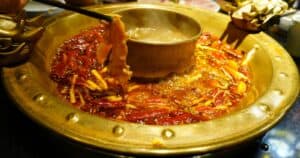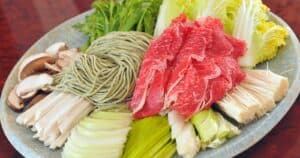Enjoying hot pot with friends and worried about keeping halal? With so many ingredients in the mix, you may be wondering if the flavorful broth base is permissible under Islamic dietary guidelines. As a popular cooking style worldwide, hot pot can definitely be made halal-friendly.
The key factors when it comes to halal hot pot are using certified halal meats and stocks, as well as avoiding alcohol or non-halal ingredients. Many standard hot pot broths are already halal, including chicken, vegetable or seafood stocks. But it’s important to verify broths, sauces and oils used are halal-certified. Also be sure to inform non-Muslim guests so they don’t accidentally add haram ingredients.
With some mindfulness when sourcing ingredients and preparing your hot pot, this popular communal dining experience can be open to halal diners. A few simple swaps let everyone gather together and enjoy savoring delicious shabu shabu or Chinese hot pot. Let’s look at how to adapt this cooking style for halal diets.
Overview of Halal Food Guidelines
Halal dietary laws determine which foods Muslims are permitted to eat under Islamic rulings. Some key halal criteria include:
- Meat Sources – Meat must come from permissible animals slaughtered according to Islamic procedures. Pork and certain seafood are haram.
- Alcohol – Any food or drink containing alcohol is prohibited. This includes dishes prepared with alcohol that has been cooked off.
- Contamination – Foods cannot come into contact with prohibited substances like pork or alcohol. Shared cooking surfaces and utensils must be washed between uses.
- Blood – Blood must be fully drained from any meat or poultry.
- Slaughter – Permitted land animals must have a ritual blessing recited at slaughter.
Followers of Islamic beliefs aim to eat halal as much as possible based on these guidelines. So what does this mean when it comes to hot pot?
Is Standard Hot Pot Base Halal?
Many common hot pot broth bases are already halal or can be adapted to meet Islamic dietary standards. Here are some typical hot pot soup bases and their halal status:
Chicken Stock
Chicken broth is a popular hot pot base. Using halal certified chicken and preparing the stock without alcohol makes this an acceptable halal ingredient.
Beef Bone Broth
Rich bone broths use beef bones and marrow for flavor. Opt for halal beef bones and keep the broth alcohol-free.
Kombu and Bonito Dashi
This Japanese soup stock uses seaweed and fish flakes, which are halal. Verify bonito flakes are not contaminated with non-halal items when produced.
Vegetable Broth
Using halal vegetables and preparing with halal stocks or water keeps vegetable broth halal.
Miso Paste
This fermented soybean paste is halal, but check for alcohol-free varieties.
Coconut Milk
Dairy-free coconut milk is generally halal. Use for Thai style hot pots.
Halal Hot Pot Meat and Seafood
Hot pot centers around an array of uncooked ingredients like thinly sliced meats and seafood cooked tableside in the broth. When selecting ingredients, consider these halal guidelines:
Meat
- Use halal certified beef, chicken, goat or lamb.
- Avoid pork, which is haram.
- Have meat slaughtered according to Islamic procedures if possible.
Seafood
- Fish, shrimp, squid and shellfish are halal.
- Be sure markets don’t cross-contaminate seafood with non-halal items when prepping.
Pork Substitutes
- Opt for beef or turkey bacon rather than pork.
- Use mushrooms like shiitake or oyster instead of pork belly.
Meat-Filled Dumplings
- Select halal certified beef or chicken dumplings, or prepare your own fillings.
- Check that dumpling wrappers aren’t made with non-halal fats.
Halal-Friendly Hot Pot Sauces and Seasonings
The variety of dipping sauces adds lots of flavor in hot pot. Here are some typically halal condiments:
- Soy sauce
- Chile sauce
- Sesame sauce
- Peanut sauce
- Hoisin sauce
- Garlic
- Ginger
- Scallions
- Lime juice
- Rice vinegar
- Chili oil
- Sesame oil
Do read labels carefully to avoid additives like alcohol or pork enzymes. You can also make your own sauces at home.
Serving Halal Hot Pot
When sharing hot pot with Muslim and non-Muslim guests, keep these halal tips in mind:
- Use separate cooking pots and cooking utensils for halal and non-halal ingredients.
- Clean cooking surfaces thoroughly between uses.
- Inform guests which ingredients are halal so they don’t accidentally contaminate.
- Offer a vegetarian/seafood broth for guests avoiding meat.
- Have guests wash hands before handling shared foods.
Planning ahead helps ensure Muslim guests can enjoy hot pot while adhering to their halal diet.
Adapting Non-Halal Hot Pot Broth
Some common hot pot broth bases contain non-halal ingredients like pork or alcohol. Here are some ingredient swaps to adapt them:
Pork Bone Broth
- Use beef or chicken bones instead of pork bones.
- For fatty richness, add mushrooms like shiitake or oyster instead of pork fat.
Hot Pot Soup Bases With Alcohol
- Opt for non-alcohol versions of broths like tom yum.
- Remove alcohol by simmering uncovered until fully evaporated.
- Substitute white grape juice or apple juice for rice wine or mirin.
Non-Halal Meat Broths
- Make broth using halal beef or chicken instead.
- For pork broth, use chicken or mushrooms for a similar savory profile.
With some easy substitutions, you can transform non-halal hot pot broths into halal-friendly options.
Top Tips for Halal Hot Pot
Follow these tips for keeping hot pot halal:
- Verify all store-bought broths, sauces and oils are halal-certified.
- Choose seafood and halal meats certified by Islamic authorities if possible.
- Cook halal and non-halal dishes separately with separate utensils.
- Avoid cross-contamination of ingredients from shared surfaces or knives.
- Inform guests which items are halal so they don’t accidentally add non-permissible ingredients.
- Stick to fresh vegetable garnishes like cilantro rather than alcohol-infused ones.
- Make your own dipping sauces from scratch to control ingredients.
- Substitute non-alcoholic liquids if a broth recipe calls for wine, mirin or rice liquor.
Is Hot Pot Halal? The Verdict
While some hot pot broths contain non-halal ingredients, the communal cooking style can definitely be adapted for Muslim diners seeking halal food. Using halal-certified meats, seafood and stocks, avoiding alcohol, and preventing contamination from haram ingredients lets everyone enjoy savoring hot pot together. With careful sourcing and prep, hot pot can be a delicious halal dining experience.
Frequently Asked Questions About Halal Hot Pot
Here are answers to some common questions about keeping hot pot halal:
Is hot pot originally a halal dish?
Hot pot originated in China and other Asian countries where halal practices were not always strictly followed. But the concept can be adapted.
Are fish balls halal?
Fish balls are generally halal, but check ingredients since some contain non-halal fillers. Make your own using halal fish or buy brands certified halal.
Can I use chicken stock cubes or bouillon powder?
Read ingredients carefully, as these may contain non-halal flavorings. Make stock from scratch using halal chicken and vegetables to be safest.
Is hot pot risky for cross contamination?
Yes, broth and ingredients can easily get contaminated on shared surfaces or utensils. Use separate pots for halal and non-halal and wash thoroughly between uses.
Should I have separate hot pots to cook halal ingredients?
Yes, best to use separate pots and cooking utensils when cooking both halal and non-halal foods in hot pot.
Keeping hot pot halal does require some extra care. But with some adaptations to ingredients and preparation, Muslim diners can happily join in this popular communal dining experience. For any other questions on halal hot pot, please let me know!





